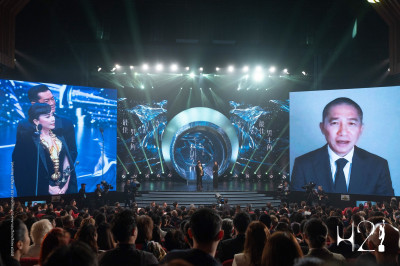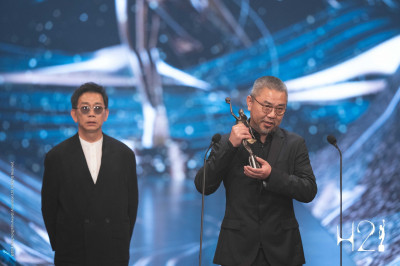《TAIPEI TIMES》 China our biggest threat, Kono says

Japanese House of Representatives member Taro Kono, left on screen, yesterday speaks with Deputy Minister of Foreign Affairs Tien Chung-kwang at the Ketagalan Forum in Taipei. Photo: Liao Chen-hui, Taipei Times
STRONG MESSAGE: If China uses force against Taiwan, Japan will be affected, so Tokyo needs to act with the global community to defend liberty and democracy, Taro Kono said
By Lee I-chia / Staff reporter
Japan, the US and like-minded nations should make China realize that a coercive annexation of Taiwan cannot be achieved within an acceptable cost and timeframe, Taro Kono, a member of the Japanese House of Representatives, said yesterday at the annual Ketagalan Forum.
The Ketagalan Forum — 2022 Indo-Pacific Security Dialogue, cohosted by the Ministry of Foreign Affairs and the Prospect Foundation, was held in Taipei yesterday.
Kono, who has also served as Japanese minister of foreign affairs and minister of defense, gave an online keynote speech about the security situation in the Indo-Pacific region from his office in Tokyo, as his plan to visit Taiwan fell through after he contracted COVID-19 two weeks ago.
“The biggest variable of the security to the region is China,” he said.
China is rapidly expanding its military, making assertive and coercive attempts to change the “status quo” in the region, overturn international norms and undermine the rules-based international order and if the international community overlooks this, the devastating consequences would not be limited to the Indo-Pacific region, but would reach across the world, Kono said.
“The CCP [Chinese Communist Party] is aiming to build a strong military to realize its ‘China dream,’” he said.
China’s military spending has increased 43-fold in 30 years, and its forces have expanded from no modern submarines and no fighter jets in 1991 to 52 submarines and nearly 1,200 fourth and fifth-generation fighter jets today, he added.
China has frequently been sending coast guard vessels into Japanese territorial waters near the Diaoyutai Islands (釣魚台) — known as the Senkakus in Japan — since 2012, militarized three islands in the South China Sea and necessitated Japan’s Air Self-Defense Force scrambling fighter jets 698 times in response to its incursions last year, Kono said.
Taiwan, China and Japan all claim the islands.
While China is unilaterally trying to change the “status quo,” “the global community must strongly oppose these actions and make the aggressor pay a high cost for them,” he said.
As the possibility of China using force against Taiwan is rising, the US and like-minded nations must consider how they could defend Taiwan from China’s aggression, he added.
“If China uses force against Taiwan, Japan will be affected,” Kono said. “So now Japan needs to show its resolve to act with the global community to defend liberty and democracy. If the US and its allies show determination, it will send a strong message to Beijing.”
“Our goal is to show the resolve of our alliance to defend and protect our common values such as liberty, democracy, human rights and rule of law, and to make China realize that a coercive annexation of Taiwan cannot be achieved within an acceptable cost and timeframe,” he said.
Citing the situation in Europe, Kono said democratic nations must stand united behind Ukraine against the brutal aggressor Russia, because “if the global community lets Putin go unpunished, it would send a wrong signal to dictatorships that they can also get away unscathed and repeat such an atrocity. Then every country and everyone could become a victim.”
Like-minded nations must also be prepared for economic warfare, as some dictators are now in possession of huge destructive power with missiles and nuclear weapons, and could attack civilians, destroy cities and economic activity quite easily, but democratic governments are less intolerant of casualties and suffering from war, and could resort to economic sanctions, he said.
Dictators can also wage economic warfare, such as Beijing using China’s imports and exports as leverage to influence other nations, including banning Taiwan’s pineapple exports to China last year, he added.
“We need to build resilient supply chains for food, energy and other strategic products, not depend on possible aggressors,” Kono said. “It might divide the global economy into blocs and reduce possible economic returns, but that is the cost of our security.”
Kono proposed creating a “United Nations 2.0,” in which no nation has a veto, so that it could become a system in which the international community can take collective action against aggression by dictators, such as establishing global peacekeeping operations.
In addition, Kono said like-minded nations in Asia need a NATO-like mechanism or to set up security arrangements to defend their common values.
That could be done by expanding existing frameworks, such as the AUKUS security pact between Australia, the UK and the US, to include Asian nations, he said.
Functional mechanisms for cooperation on trade, economics, the environment, healthcare and other aspects are also important, he said, adding that the Comprehensive and Progressive Agreement for Trans-Pacific Partnership is a good regional mechanism which Taiwan should be allowed to join, and hopefully the US would soon realize its importance and rejoin.
新聞來源:TAIPEI TIMES

















